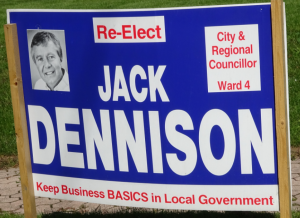 By Staff
By Staff
October 31st, 2017
BURLINGTON, ON
New provincial rules ban city council candidates from accepting corporate and union donations, change the maximum allowable gifts, and regulate third-party interventions in next fall’s municipal elections. There is also a restriction on how much can be spent on post-election gifts and parties.
The new rules limit the length of the campaign. It will start on May first instead of the traditional January 1, and nominations will not be accepted after July 27 rather than the former late September deadline. The election will take place on October 22.

Pete Ward photographing his wife when she filed her nomination papers last time around. Will Marianne Meed Ward be filing nomination papers on May 1, 2018.
The elimination of corporate and union monies from the coffers of candidates could assist challengers who in past elections have been financially out-matched by well-established incumbents.
The new rules approved earlier this year increase the maximum individual donation to a candidate to $1200 giving extra power to wealthier donors. The previous maximum was $750. However total allowable donations by an individual to two or more candidates remains at $5000.
That’s also the maximum that a third party can spend in advertising on behalf of one or more candidates.
“A third party advertisement is a message in any medium (billboard, newspaper, radio, etc.) that supports or opposes a candidate or a ‘yes’ or ‘no’ vote on a question on the ballot,” explains the provincial government website on the new rules. “Third party advertising does not include issues-based advertising so groups that do public outreach can continue their issued-based advocacy work throughout the municipal election period.”

Jack Dennison has always been very very coy about whether or not he is going to run again – wild horses couldn’t hold him back. Who funds his campaign is another matter altogether.
Corporations and unions as well as individuals can register as third party participants in the municipal election campaign, but their ads must identify the funder. That allows corporate and union monies to continue to influence the election outcomes but who is backing who will be evident before election day, rather than the previous system where voters only found out when campaign financial reports were filed months after voting day.
“Third party advertising must be done independently of candidates, who are not able to direct a third party advertiser,” warns the provincial government. “Candidates are not able to register as third party advertisers.”
Candidates will still be allowed to pour large amounts of their own monies into their campaign.

Ward 2 Councillor Marianne Meed Ward held her campaign announcement at the Art Gallery and was told by the City Clerk that her supporters could not wear their campaign T-shirts on city property. An asinine interpretation of the Municipal Act.
A candidate for mayor can contribute $7,500 plus 20 cents for each elector entitled to vote for the office or $25,000, whichever is less.
A candidate for council can contribute $5,000 plus 20 cents for each elector entitled to vote for the office or $25,000, which is less.”
We are indebted to CATCH xxx for this information


















Let us just look in the old Political Crystal Ball and ask will the ‘Code of Conduct’ be signed by old group before May 2018? Volunteers to City Hall have to sign before attending the first meeting.
So, if I read this correctly, a corporation or a union can’t donate directly to a candidate, but they could conceivably set up a shell organization (i.e. third party), fund it, and then use those funds to support candidates favourable to their cause or issue. Kind of like what is going on with ACTWow.ca and its anti-Patrick Brown ads. ACTWow is a front organization for the Service Employees International Union.
Re: “Third party advertising must be done independently of candidates, who are not able to direct a third party advertiser”. I’d love to know how one proves or disproves this. The fact that an ad carries a declaration in small print in the bottom right hand corner identifying the funder doesn’t give me any greater sense of comfort that this is a transparent process. I had to go on the ACTWow website to see who are the cretins funding the anti-Progressive Conservative ads.
Unions, corporations and special interest groups, particularly developers and the bike lobbyists, need to stay the hell out of municipal politics. Let independent voters decide. We aren’t children, and we don’t need to be micro-managed and manipulated like 3 year olds!
Hey Steve,
If I understand the rules corporations/unions can not donate to municipal candidates. However they or anyone can setup a super pack. So for example you could setup candidate X hates trees pack – solicit donations then advertise against them. Or setup a super pack for a candidate then solicit donations and advertise – candidate x loves trees – vote for them.
There are limits – except if you advertise on an “issue” in which case the sky is the limit. What ever that means. Fyi If you send the ministry a question on the rules – they just punt to – “consult a lawyer”. Your remedy is “legal action against a opponent”.
Since legal action is not going to reverse an election – no matter what goes on – as you alluded too – no policing or enforcement exists as far as I can see.